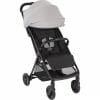Beauty & Wellness
Everything You Need to Know About Perinatal Obsessive-Compulsive Disorder
A pal recently got in touch with me to inquire if I’d experienced any “unwelcome thoughts” since becoming a parent. I had to ponder it because, while postpartum depression is something most of us are aware of, we don’t hear as much about the anxiety and intrusive thoughts that can occur on the journey to becoming a parent.
While pondering intrusive thoughts, my inquisitiveness led me to Dr. Fiona Challacombe, a researcher and a clinical psychologist with a Ph.D. in perinatal OCD. Dr. Fiona also serves on the Scientific Advisory Panel of Maternal OCD, an organization that has made it its mission to de-stigmatize perinatal OCD.
Dr. Fiona assisted in addressing numerous queries related to perinatal OCD, commonly referred to as postpartum OCD, including how to seek assistance. Always reach out to your healthcare provider if you or someone you know is having difficulty dispelling unwanted thoughts.
Postpartum anxiety, depression, and perinatal OCD can feel isolating, but no one should have to feel as if they’re facing it alone. Please reach out to your doctor, a therapist, or another trusted professional for support.
If you are experiencing suicidal thoughts or actions, please seek help immediately.
National Suicide Prevention Lifeline: 988 or 1-800-273-TALK (1-800-273-8255)
Crisis Textline: text HOME to 741741
What exactly is perinatal OCD and its causes?
If Obsessive-Compulsive Disorder, or OCD, is unfamiliar to you, it’s an anxiety-related condition mainly centered on obsessions (recurring, unwanted, intrusive, and distressing thoughts) and compulsions (actions performed repeatedly to handle obsessions). Perinatal OCD is OCD that arises during pregnancy or the postpartum period. OCD tends to latch onto what’s significant to the individual at the time, and with perinatal OCD, it frequently relates to pregnancy or caregiving. Although it does not have a distinct diagnosis in any of the diagnostic systems, it’s best to perceive it as OCD occurring in a specific context, clarified Dr. Fiona.
“Intrusive thoughts are entirely normal, and we all experience them, akin to standing at the subway and momentarily thinking you could push someone,” stated Dr. Fiona, “but with OCD, it’s the way you interpret them that’s truly the problem. The recipe for intrusive thoughts often involves situations where you’re stressed, you’ve encountered increased responsibility, and you have a heightened awareness of threats—and the perinatal period encompasses all of these.”
It was fascinating that having anxiety or an OCD diagnosis is not necessary to encounter perinatal OCD. “It’s because it comes down to how you process thoughts and stress levels, for instance,” mentioned Dr. Fiona. If you already have an OCD diagnosis, you may have a predisposition for it, and the stressful time can heighten the likelihood, but it’s not inevitable. Having experience in altering your cognitive thoughts can help prepare for the potential development of perinatal OCD.
While the cause of these thoughts is uncertain, we are aware that psychological, biological, and situational factors play a significant role. Some individuals are simply more vulnerable to hormonal changes. These various factors culminate into this particular issue based on how one interprets their thoughts, such as attributing meaning that just thinking the thoughts alone makes them a bad person, crazy, or a danger to their baby.
How widespread is perinatal OCD?
Although shame and fear of judgment may hinder individuals from disclosing their symptoms and have contributed to the difficulty in identifying perinatal OCD, it is more prevalent than one might assume. Research by Dr. Jonathan Abramowitz, a professor and associate chair at the University of North Carolina, has revealed that “as many as 91 percent of new moms and 88 percent of new dads experience thoughts of harm to their children.” However, these thoughts don’t always correspond to perinatal OCD.
As many as 91 percent of new moms and 88 percent of new dads experience thoughts of harm to their children. However, these thoughts don’t always correspond to perinatal OCD.
Manifesting in either caregiver, irrespective of gender, indicates it’s more of a cognitive issue rather than solely a hormonal issue. Nevertheless, its recognition among men is less due to their reluctance to seek treatment.
Signs of perinatal OCD
There’s a spectrum from constantly thinking to concerns about safety and viewing oneself as a possible threat in perinatal OCD, and numerous common ways it can manifest. “One of the most common manifestations is intrusive thoughts about causing harm, and yet it’s one of the most challenging ones to discuss due to the stigma,” remarked Dr. Fiona.
This is extremely distressing as it is frequently misunderstood by medical professionals unfamiliar with OCD. Another typical manifestation is parents having intrusive thoughts about pedophilia while changing diapers, despite being unlikely to act on it. The fear of harm befalling your child due to making a mistake or performing a wrong action drives these intrusive thoughts. Approximately 3-5 percent of mothers/birthing individuals report feeling as if they “cannot escape these intrusive, irrational, and distressing thoughts unless they carry out a repetitive act.”
Seeking assistance for perinatal OCD
If you’ve recognized some of these symptoms in yourself or someone you know, the primary step is to accept that it’s a common occurrence, and there’s nothing wrong in experiencing them. Dr. Fiona emphasizes that “there’s no evidence that caregivers act on intrusive thoughts, images, or compulsions since we experience intrusive thoughts about things we don’t want to happen. Nevertheless, your brain will actually attempt to come up with supporting evidence that it could happen”.
Tackling Perinatal Obsessive-Compulsive Disorder
Cognitive Behavioral Therapy (CBT) is a recommended approach to treating perinatal OCD. Although various approaches exist, Dr. Fiona prefers to establish a mutual understanding of the intrusive thoughts, examining how they occur for you, the significance you’ve attributed to them, and how you maintain that significance.
“Understanding what the thoughts mean to you is a major aspect of CBT; it’s not the thought itself but rather the meaning you attach to it. Ask yourself, what have I been doing to justify the fear that I am a bad or a dangerous person?” Dr. Fiona remarked. “Using CBT to tackle perinatal OCD involves learning that it presents itself as a safety matter, yet the real problem is about fear and anxiety.” The more you try to suppress the thought, the more power you confer upon it instead of acknowledging the unpleasant thought and letting it go. They are just thoughts, and it’s about retraining our minds to perceive them that way. Permit the thought to enter your mind without passing judgment and carry on, bolstering your self-assurance and trust in yourself.
Untreated perinatal OCD can induce distress, and potential disruption of caregiver-infant relationships, and misdiagnosis can lead to a diminished quality of life as the issue persists. This is why it’s crucial to eliminate the stigma around these undesirable thoughts and provide support for those undergoing them.
Dr. Fiona recommended that anyone seeking help should “educate themselves as much as possible and seek advice from a medical professional well-versed in OCD and intrusive thoughts.” Pose queries during the initial consultation to comprehend their treatment approach and establish trust. Dr. Fiona collaborates with Maternal OCD to educate medical professionals on recognizing and treating perinatal OCD. One of Maternal OCD’s objectives is to assist medical professionals in acknowledging the anxiety and OCD occurring during the perinatal period as opposed to dismissing it as solely “baby blues”. “It’s important for the general populace to realize that perinatal OCD is a frequent, understandable problem that is manageable with the right help and that individuals can thrive,” stated Dr. Fiona.

























